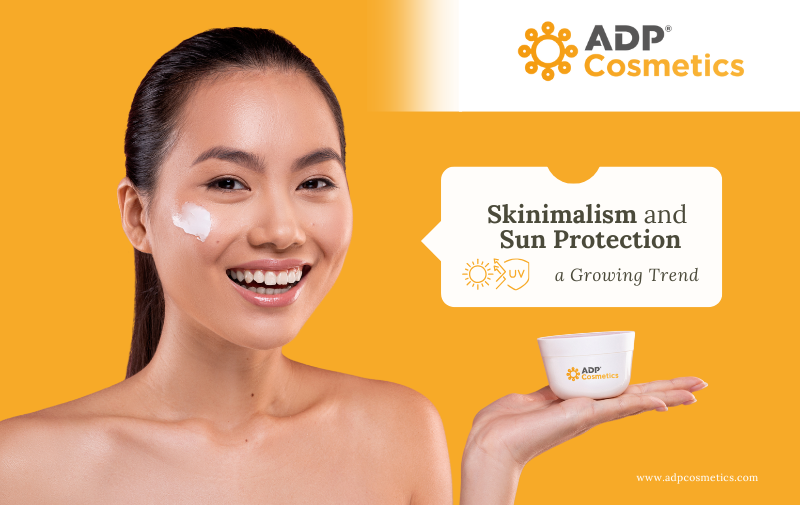Skinimalism, the trend of simplifying skincare routines, continues to gain popularity, driven by greater awareness of the importance of essentials, time, and resource optimization. In this article, we explore how skinimalism is influencing the cosmetics industry, particularly in sun protection, and how multi-purpose products are revolutionizing skincare without compromising effectiveness or results.
What is Skinimalism? Skinimalism is rooted in the concept of simplifying skincare routines by eliminating unnecessary products and focusing only on essentials. This approach maximizes the use of each product’s technology and innovation, promoting high-quality, effective products with multiple benefits. This enables consumers to enjoy a more efficient, less overwhelming routine. Within this framework, sunscreens have emerged as key products, offering comprehensive protection while simplifying skincare when incorporated into daily-use products or routines associated with cosmetics and makeup.
Sun Protection in the Age of Skinimalism
A core principle of skinimalism is providing the skin with only what it needs: cleansing, removing dead cells and impurities, toning, hydrating, and of course, protecting against UVB–UVA rays (among other types of radiation that we’ll discuss further*). Exposure to these rays without adequate protection not only causes immediate damage, such as sunburn and dark spots, but is also one of the main contributors to premature aging and increased skin cancer risk.
Thus, effective sunscreen is considered an essential step in any skincare routine, including skinimalism.
Benefits of Sun Protection:
- Skin Cancer Prevention: Regular sunscreen use can reduce the risk of melanoma, one of the most dangerous types of skin cancer.
- Photoaging Prevention: Sun protection also helps prevent wrinkles, dark spots, and loss of elasticity, reducing visible signs of premature aging.
- Protection from Various Radiations: Effective sunscreens protect against UVA rays (responsible for premature aging) and UVB rays (which cause sunburn). Moreover, exposure to high-energy visible (HEV) light and infrared-A (IR-A) rays, which also negatively affect the skin, has led to the development of sunscreens with broader protection.
Advancements in Formulations and Sensory Appeal with Mineral Filters Mineral sunscreens, also known as physical sunscreens, use natural ingredients such as zinc oxide and titanium dioxide that form a barrier on the skin’s surface to reflect and disperse UV rays. These ingredients are ideal for sensitive skin, as they don’t penetrate the skin and work more immediately than chemical filters.
Sustainability and the Environment: Today’s Priority As skinimalism gains popularity, consumers are increasingly mindful of product sustainability. Mineral sunscreens have thus become a more eco-friendly option. Chemical filters like oxybenzone and octinoxate have been linked to harm in marine ecosystems and coral reefs, leading some countries to ban their use in sun protection products.
Mineral filters, on the other hand, are generally safer for the environment. Additionally, innovations and advancements in manufacturing processes, such as those implemented by ADP, involve cleaner and more responsible production practices, reducing carbon footprint and environmental impact. This is especially relevant for consumers seeking products that not only benefit their skin and health but are also planet-friendly.
The Future of Skinimalism and Sun Protection
Skinimalism is more than an aesthetic trend; it is a shift towards simplicity, efficacy, and sustainability. With increasing demand for multifunctional products, sun protection is now a central element in our daily routines. The cosmetics industry faces the challenge of providing products that not only offer effective UV protection but also respect the environment and are comfortable and easy to use.
As formulations and technological innovations advance, mineral sunscreens are emerging as an ideal choice for those seeking effective, eco-friendly, and high-quality products. With the incorporation of new technologies and improvements in sensory appeal, the future of sun protection has never been more promising.
Conclusion In summary, skinimalism is transforming the skincare and sun protection markets. Consumers are now looking for simpler, more effective, and sustainable options. Mineral sunscreens provide comprehensive protection against various types of radiation, including the blue light from screens that we’re increasingly exposed to. At the same time, consumers’ purchasing decisions are influenced by factors like skin- and environment-friendliness, as well as the growing trend of clean labels. The key to meeting this trend is opting for high-quality products with advanced technology that benefit both the skin and the planet, and that demonstrate responsibility at every step.










